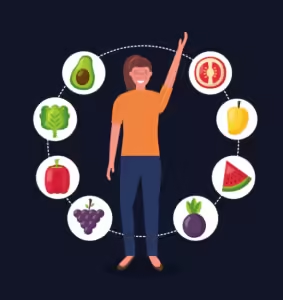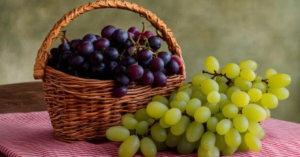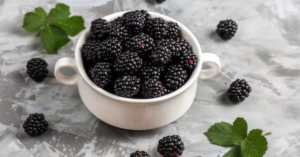10 Best Foods to Eat in the Morning for Energy
Breakfast is not just the first meal of the day; it is your opportunity to start well. People also believe that eating the best foods at the correct time of the day, specifically in the morning, can provide you with the required energy to put the day.
Don’t take something which will just take the form of a cookie and make you dizzy; take foods which will make you strong. In this article, we’ll aim to explore top 10 foods that are perfect for the morning meals if you want to stand a better chance of powering your day.
What Makes a Good Breakfast?
A good breakfast can be determined by the balance of all the foods we consume at that point in the day. It is advisable to combine all the macronutrients, carbohydrates, proteins, and fats with the -vitamins and minerals.
Carbohydrates give fast energy, and then proteins and fats sustain this energy. And last but not least, there is the there is the example of fibre, which makes you full and maintains a stable level of blood sugar. These foods must be taken in combination to get all these nutrients in the morning and boost your
Top 10 Best Foods for Morning Energy
1. Oats
Oats are the best breakfast to take in the morning because they are full of complex carbohydrates, which release energy, hence the energy needed throughout the morning. Also, oats are a source of fibre, and this helps in digestion besides taking time to develop hunger again.
1. Oats (1/2 cup, dry)
| Nutrient | Amount |
|---|---|
| Calories | 150 kcal |
| Carbohydrates | 27 g |
| Protein | 5 g |
| Fat | 3 g |
| Fibre | 4 g |
| Iron | 2 mg |
| Magnesium | 138 mg |
2. Eggs
Breakfast, as you may know, is the most important meal of the day, and when you take eggs, you are surely on the right track. Eggs are great sources of protein.
It’s packed with good-quality protein needed for the formation of muscles as well as for muscle repair and sustaining energy. Flamingo prefers eggs in different types of preparations: scrambled, boiled or poached, which can be eaten alongside other forms of food.
Eggs (1 large egg)
| Nutrient | Amount |
|---|---|
| Calories | 70 kcal |
| Carbohydrates | 1 g |
| Protein | 6 g |
| Fat | 5 g |
| Cholesterol | 186 mg |
| Vitamin D | 41 IU |
| Vitamin B12 | 0.6 mcg |
3. Greek Yogurt
Greek yogurt is a great source of protein & good for gut bacteria, which in foods are known as probiotics. The protein makes you feel full, while the probiotics help with the function of the gut, which is so important for digestion and energy. Consume yogurts that not contain sugars and incorporate fruits and nuts into the dish for the breakfast meal.
Greek Yogurt (6 oz., plain, low-fat)
| Nutrient | Amount |
|---|---|
| Calories | 100 kcal |
| Carbohydrates | 6 g |
| Protein | 15 g |
| Fat | 2 g |
| Calcium | 187 mg |
| Potassium | 240 mg |
| Vitamin B12 | 1 mcg |
4. Bananas
A banana is like nature’s self-proclaimed energy bar. They have fructose, glucose, and sucrose, which go straight to the energy compartments of the body, giving extra energy. Also, bananas are sources of potassium, which plays an important role in muscle and nerve activities.
Banana (1 medium)
| Nutrient | Amount |
|---|---|
| Calories | 105 kcal |
| Carbohydrates | 27 g |
| Protein | 1 g |
| Fat | 0.3 g |
| Fiber | 3 g |
| Potassium | 422 mg |
| Vitamin C | 10 mg |
5. Almond Butter
Like its peanut butter counterpart, almond butter also has high quantities of healthy fats and protein, that would be really useful in the morning. Consume it on toast spread on whole grains or mix a spoonful of it into your oatmeal for a creamy and energy-boosting meal.
Almond Butter (1 tablespoon)
| Nutrient | Amount |
|---|---|
| Calories | 98 kcal |
| Carbohydrates | 3 g |
| Protein | 2 g |
| Fat | 9 g |
| Fiber | 2 g |
| Vitamin E | 3.4 mg |
| Magnesium | 49 mg |
6. Whole-grain toast
Whole-grain toast is rich in complex carbohydrates, which are the best sources of energy in that they release energy slowly. As compared to refined carbs, whole grains give you more fibre and nutrients to make sure you do not get worn out easily. Enjoy it with eggs, avocado or almond butter to make a whole meals out of it.
Whole Grain Toast (1 slice)
| Nutrient | Amount |
|---|---|
| Calories | 69 kcal |
| Carbohydrates | 12 g |
| Protein | 4 g |
| Fat | 1 g |
| Fiber | 2 g |
| Iron | 0.7 mg |
| Magnesium | 23 mg |
7. Berries
That fruit is not only tasty but also enriched with vitamins, antioxidants, and fibre; one can note strawberries, blueberries, and raspberries. They can be beneficial against oxidative stress and inflammation as energy-boosting agents.
Berries (1 cup, mixed berries)
| Nutrient | Amount |
|---|---|
| Calories | 70 kcal |
| Carbohydrates | 17 g |
| Protein | 1 g |
| Fat | 0.3 g |
| Fiber | 7 g |
| Vitamin C | 60 mg |
| Vitamin K | 36 mcg |
8. Chia Seeds
Despite the sizes of these seeds, Chia seeds are very powerful in terms of the energy they carry. These are packed with whey fat, fibre, omega-3 fatty acids, and proteins, making them not have peaks and troughs of energy. Eaten together, you can sprinkle them onto your yogurt, your smoothie, or your oatmeal, ‘boosting’ them with so much nutrition.
Chia Seeds (2 tablespoons)
| Nutrient | Amount |
|---|---|
| Calories | 120 kcal |
| Carbohydrates | 12 g |
| Protein | 4 g |
| Fat | 8 g |
| Fiber | 10 g |
| Omega-3s | 4915 mg |
| Calcium | 179 mg |
9. Avocado
Avocados contain specialised fats—monounsaturated fats—that are good for the heart and the brain as well. They also have fibre, potassium, and vitamins that make up the energy-creating organs in the body. Simply topping a slice of toast with avocado or incorporating it in scrambled eggs gives a very rich feeling in the morning.
Avocado (1/2 medium avocado)
| Nutrient | Amount |
|---|---|
| Calories | 120 kcal |
| Carbohydrates | 6 g |
| Protein | 1 g |
| Fat | 11 g |
| Fiber | 5 g |
| Potassium | 345 mg |
| Vitamin K | 14 mcg |
10. Green Smoothies
In term of eating healthy, green smoothies are some of the best ways to start your day, and you say that Energy-boosting breakfast drink . To prepare the drink, the consumer needs to wash and temp spinach or kale with fruits, chia seeds, and a protein source. It’s easy and tremendously time-saving for those who wake up in the morning with no time to cook.
Green Smoothie (1 serving, with spinach, banana, and almond milk)
| Nutrient | Amount |
|---|---|
| Calories | 150 kcal |
| Carbohydrates | 30 g |
| Protein | 3 g |
| Fat | 3 g |
| Fibre | 5 g |
| Vitamin A | 2820 IU |
| Potassium | 400 mg |
What to Avoid in the Morning for Energy
some points that one must avoid in the morning for energy are:
- Sugary Cereals: These uplift your blood sugar and results in an even quicker drop.
- Pastries and Doughnuts: Some of the factors state that they are high in sugar and unhealthy fats and thus cause energy crash.
- White bread: Saccharine, lacks fibre; begins to droop mid-afternoon.
- Sugary Drinks: Discharge atypical bursts of energy and then reduce your energy levels; they are dehydrate as well.
- Processed Meats: are very fatty and high in sodium, These foods cause lethargy in consumers.
- Flavoured Yogurts: Containing extra sugars that produce energy lows.
- Muffins are high in sugar and refined carbohydrates to give you an immediate energy boost.
- Low-Fat and Diet Foods: Sometimes contain a lot of sugar or some type of approved artificial sweetener and then you crash.
To sustain energy, avoid refined carbohydrates, saturated fats, and foods that contain hidden sugars.
Conclusion
Sometimes it is good to start your day with certain groups of foods that will enable you go through the day’s activities. In order to sustain energy in the morning, one should eat foods that contain carbohydrates, proteins, and fats. Including such choices as oats, eggs, and avocados in your breakfast will assist you in being triumphant and provide energy needed all day. Therefore, the next time you are deciding on what to take for breakfast, you should choose foods that will nourish your body and mind.
Frequently asked questions
How soon after waking up should I eat breakfast?
Breakfast should ideally be taken as soon as an hour after waking up in the morning so as to wake up body metabolism to respond to the day’s activities.
Can I have coffee with my energy-boosting breakfast?
Of course, coffee as a part of breakfast is useful, but you have to consume it with some foods containing nutrients, so you won’t crash afterward.
What if I don’t have time to prepare a full breakfast?
Here are some immediate ‘clean’ products: green smoothie or natural nonfat Greek yogurt with fruit, for example. These can be prepared in minutes and are still energy giving and packed full of important nutrients.
Are these foods suitable for kids too?
Absolutely! These foods contain nutrients that help to enhance energy in children and grownup. It is as simple as that: you just need to modify portion sizes in relation to their demands.
Can I eat these foods if I’m on a diet?
Indeed, these foods are dense in nutrients and should not cause a problem in any eating plan. It is advisable that you should be very careful with your portions and total caloric consumption.










Post Comment